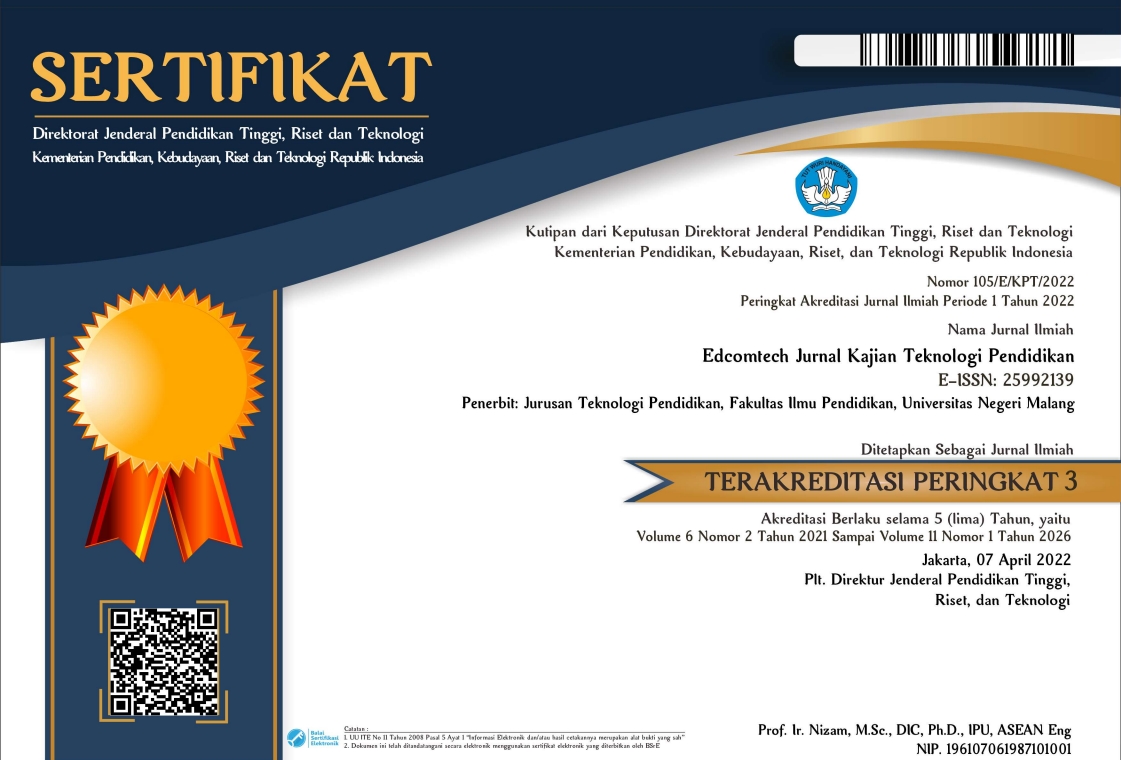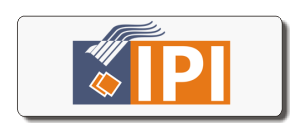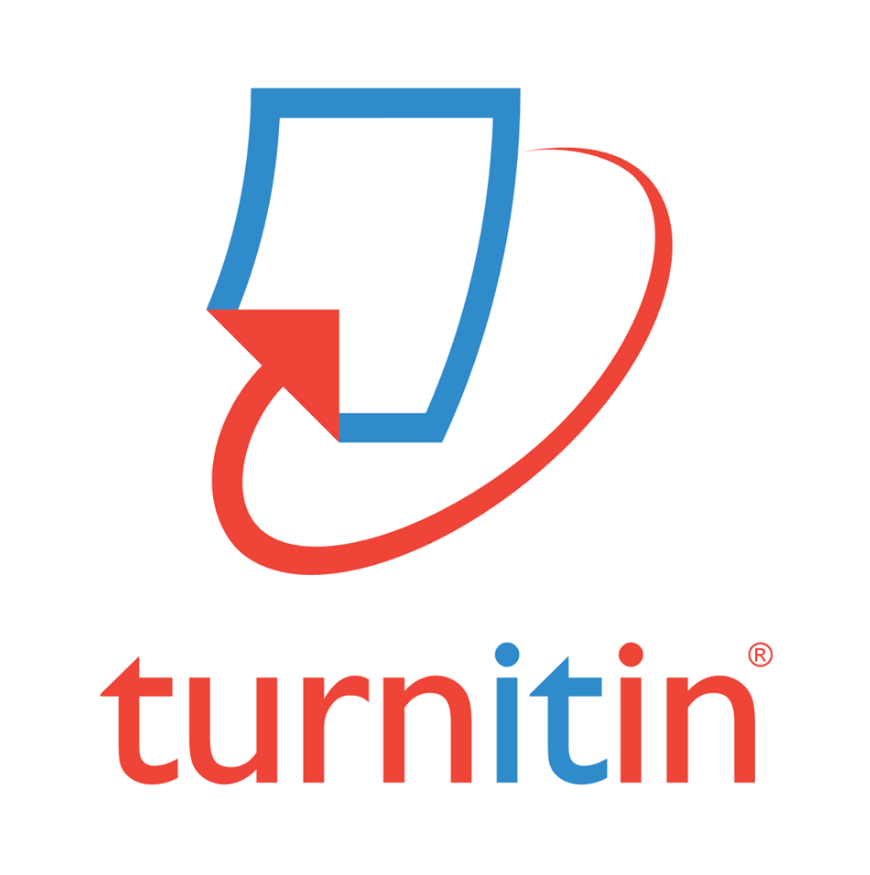Pengembangan E-Pub Untuk Administrasi Sistem Jaringan
Abstract
Abstrak: Pembelajaran di SMK merupakan pendidikan vokasi memiliki karakteristik tersendiri. Mata pelajaran Adminsitrasi Sistem Jaringan (ASJ) pada kompetensi keahlian Teknik Komputer dan Jaringan (TKJ) mempelajari tentang prosedur bagaimana sebuah komputer dapat berperan menjadi server sehingga membutuhkan ketelitian untuk melakukan konfigurasi layanan jaringan yang sesuai prosedur. Tujuan penelitian ini menemukan efektifitas pengembangan buku digital ePub sebagai bahan ajar pendamping dalam proses pembelajaran. Pengembangan buku digital ePub menggunakan model ADDIE dengan teknik analisis data bersifat deskriptif. Hasil validasi kelayakan produk pengembangan yaitu ahli isi/materi TKJ sebesar 90,67%, ahli media pembelajaran sebesar 90,52%, dan ahli desain pembelajaran sebesar 96%. Evaluasi produk kepada pengguna (siswa) melalui angket mendapatkan respon yang sangat baik. Uji coba produk yang telah dilakukan dapat meningkatkan efektifitas pembelajaran dengan meningkatnya nilai tes akhir siswa. Sehingga dapat disimpulkan bahwa produk yang telah dikembangkan layak digunakan dalam pembelajaran Administrasi Sistem Jaringan.
Abstract: Learning in vocational schools is a vocational education has its own characteristics. Network System Administration (ASJ) subjects in Computer and Network Engineering (TKJ) competencies learn about procedures how a computer can act as a server so it requires accuracy to configure network services according to procedure. The purpose of this study is to find the effectiveness of ePub digital book development as a teaching material in the learning process. Development of ePub digital books using ADDIE models with descriptive data analysis techniques. The results of the or validation of the feasibility of product development are content experts / TKJ by 90.67%, learning media experts by 90.52%, and learning design experts by 96%. Product evaluations to users (students) through a questionnaire get a very good response. Product trials that have been carried out can increase the effectiveness of learning by increasing student final test scores. So it can be concluded that the product that has been developed is feasible to use in learning Network Administration System.
Keywords
Full Text:
PDFReferences
Aji, M., & Widjanarko, D. (2016). Pengembangan Media Pembelajaran Memahami Dan Memelihara Sistem Starter Tipe Konvensional Berbasis Buku Digital Electronic Publication (EPUB). Jurnal Pendidikan Teknik Mesin Unnes, 16(1), 128007.
Anggraeni, D. M., & Sole, F. B. (2018). E-Learning Moodle, Media Pembelajaran Fisika Abad 21. Jurnal Penelitian Dan Pengkajian Ilmu Pendidikan: E-Saintika, 1(2), 57–65. doi: 10.36312/e-saintika.v1i2.101
Asiyah, S., Budiyanto, C. W., & Tamrin, A. G. (2018). Technology Acceptance Model in the Analysis of the Influence Of E-Learning Implementation to Students’ Motivation. IJIE (Indonesian Journal of Informatics Education), 2(1), 51. doi: 10.20961/ijie.v2i1.14496
Astuti, O. W., & Kusumajanto, D. D. (2017). Development of Electronic Book (E-Book) EPUB-Based for Display Course. Jurnal Pendidikan Bisnis Dan Manajemen, 3(2), 157–164. doi: 10.17977/um003v3i22017p157
Bau, S., Sunardi, M., & Sudiyanto, M. (2017). Development of E-Book-Based Discovery Learning to Improve Motivation and Learning Outcomes on Accounting Education University of Flores East Nusa Tenggara. doi: 10.2991/ictte-17.2017.73
Bhattacharjee, B., & Deb, K. (2016). Role of ICT in 21 st Century’s Teacher Education. International Journal of Education and Information Studies, 6(1), 1–6.
Chang, H. P., & Hung, J. C. (2018). Comparison of the features of EPUB e-book and SCORM e-learning content model. International Journal of Distance Education Technologies, 16(2), 1–17. doi: 10.4018/IJDET.2018040101
Chen, M., Dai, M., Luo, H., Zou, X., & Liu, S. (2016). Design and Implementation of an Android EPUB3.0 eBook Learning System. doi: 10.2991/icmmita-16.2016.226
Darma, R. S., Setyadi, A., Wilujeng, I., Jumadi, & Kuswanto, H. (2019). Multimedia Learning Module Development based on SIGIL Software in Physics Learning. Journal of Physics: Conference Series, 1233(1). doi: 10.1088/1742-6596/1233/1/012042
Figueiredo, M., Bidarra, J., & Bostad, R. (2016). The development of an ebook for teaching and learning mathematics. Lecture Notes in Computer Science (Including Subseries Lecture Notes in Artificial Intelligence and Lecture Notes in Bioinformatics), 9739, 49–56. doi: 10.1007/978-3-319-40238-3_5
Irum, S., Munshi, P., Bhatti, T., & Awan, J. H. (2018). University Teachers knowledge about technological devices and their use: An Analytical study. International Journal of Computer Science and Network Security, 18(8), 74–80.
Kembuan, D. R. E., Rompas, P. T. D., Mintjelungan, M., Pantondate, T., & Kilis, B. M. H. (2018). Teaching Quality and Learning Creativity in Technical and Vocational Schools. IOP Conference Series: Materials Science and Engineering, 306(1). doi: 10.1088/1757-899X/306/1/012028
Kurt, S. (2017). ADDIE Model: Instructional Design. doi: 10.1017/CBO9781107415324.004
Mardiyah, M., Mustaji, M., & Sitompul, N. (2019). Meningkatkan Keterampilan Writing Of Narrative Text Dengan Menggunakan Teaching Materials. Edcomtech Jurnal Kajian Teknologi Pendidikan, 4(2), 89–95. doi: 10.17977/um039v4i22019p089
Masran, S. H., Marian, M. F., Yunus, F. A. N., Rahim, M. B., & Baser, J. A. (2017). Effectiveness of using an interactive media in teaching and learning: A case study. Proceedings of the 2017 IEEE 9th International Conference on Engineering Education, IEEE ICEED 2017, 2018-Janua, 222–227. doi: 10.1109/ICEED.2017.8251197
Ningsih, S., & Adesti, A. (2019). Pengembangan Mobile Learning Berbasis Android pada Mata Kuliah Strategi Pembelajaran Universitas Baturaja. Edcomtech, (2), 163–172.
Purba, K. R., Liliana, & Runtulalu, D. (2017). Development of interactive learning media for simulating human digestive system. Proceedings - 2017 International Conference on Soft Computing, Intelligent System and Information Technology: Building Intelligence Through IOT and Big Data, ICSIIT 2017, 2018-Janua, 270–274. doi: 10.1109/ICSIIT.2017.67
Purnamawati, P., Arfandi, A., & Nurfaeda, N. (2019). The level of use of information and communication technology at vocational high school. Jurnal Pendidikan Vokasi, 9(3), 249–257. doi: 10.21831/jpv.v9i3.27117
Risnawati, Amir, Z., & Sari, N. (2018). The development of learning media based on visual, auditory, and kinesthetic (VAK) approach to facilitate students’ mathematical understanding ability. Journal of Physics: Conference Series, 1028(1). doi: 10.1088/1742-6596/1028/1/012129
Rufii, R. (2015). Developing Module on Constructivist Learning Strategies to Promote Students’ Independence and Performance. International Journal of Education, 7(1), 18. doi: 10.5296/ije.v7i1.6675
Rustaman, A. H., Iqbal, M., & Amelia, W. (2019). Pengembangan Modul Digital Praktikum Komputer Grafis 1 Dalam Format Elektonik Publication (EPUB) Untuk Meningkatkan Pemahaman Teknik Grafis Mahasiswa Desain Komunikasi Visual (Topik: Digital Imaging). Jurnal Ilmu Sosial Dan Pendidikan, 3(1), 224–229.
Sari, A. S. (2017). Pengembangan Buku Digital Melalui Aplikasi Sigil Pada Mata Kuliah Cookies Dan Candys. Jurnal Science Tech, 3(2), 46–54.
Schreglmann, S. (2018). Developing Academic Motivation Scale for Learning Information Technology (AMSLIT): A Study of Validity and Reliability. Journal of Education and Learning, 7(4), 145. doi: 10.5539/jel.v7n4p145
Surahman, E., Sulthoni, S., Ulfa, S., Husna, A., Ramdiana, H., Thaariq, Z. Z. A., … Qolbi, M. S. (2020). Pelatihan Micro Learning Object Berbasis TPACK bagi Guru-Guru SMA di Garut. Abdimas Pedagogi: Jurnal Ilmiah Pengabdian Kepada Masyarakat, 3(1), 1–14.
Syaimar, C. P., & Sutiarso, S. (2017). Pengembangan media pembelajaran berbasis mobile dalam meningkatkan motivasi dan kemampuan matematis siswa. Prosiding {Seminar} {Nasional} {Matematika} Dan {Pendidikan} {Matematika}, 1, 5.
Vinu, P. V., Sherimon, P. C., & Krishnan, R. (2011). Towards pervasive mobile learning—The vision of 21 st century. Procedia - Social and Behavioral Sciences, 15, 3067–3073. doi: 10.1016/j.sbspro.2011.04.247
Wardani, M., Rufi’i, R., & Harwanto, H. (2019). The Effect Of Ict-Based Learning On Students’ Learning Achievement Of Computer System In Vocational High School. Edcomtech Jurnal Kajian Teknologi Pendidikan, 4(1), 27–37. doi: 10.17977/um039v4i12019p027
DOI: http://dx.doi.org/10.17977/um039v6i12021p089
Refbacks
- There are currently no refbacks.
Copyright (c) 2020 Chandra Setia Rini, Nurmida Chaterine Sitompul, Yoso Wiyarno .

This work is licensed under a Creative Commons Attribution-ShareAlike 4.0 International License.
Edcomtech: Jurnal Kajian Teknologi Pendidikan published by Department of Educational Technology, Faculty of Education, State University of Malang in Collaboration with Asosiasi Program Studi Teknologi Pendidikan Indonesia (APS TPI) and Ikatan Profesi Teknologi Pendidikan Indonesia (IPTPI) with MoU.
Publisher Address:
Lab. Teknologi Pendidikan, Gd.E2, Lt.1
Fakultas Ilmu Pendidikan Universitas Negeri Malang
Jalan Semarang No 5, Kota Malang Kode Pos 65145
Email: edcomtech.fip@um.ac.id
========================================================================================================
| INDEXED BY | TOOLS | PLAGIARISM CHECK | ARTICLE TEMPLATE |
|

Edcomtech is licensed under a Creative Commons Attribution-ShareAlike 4.0 International License.
Edcomtech Statistics (Since July 13th, 2020)












1.png)








